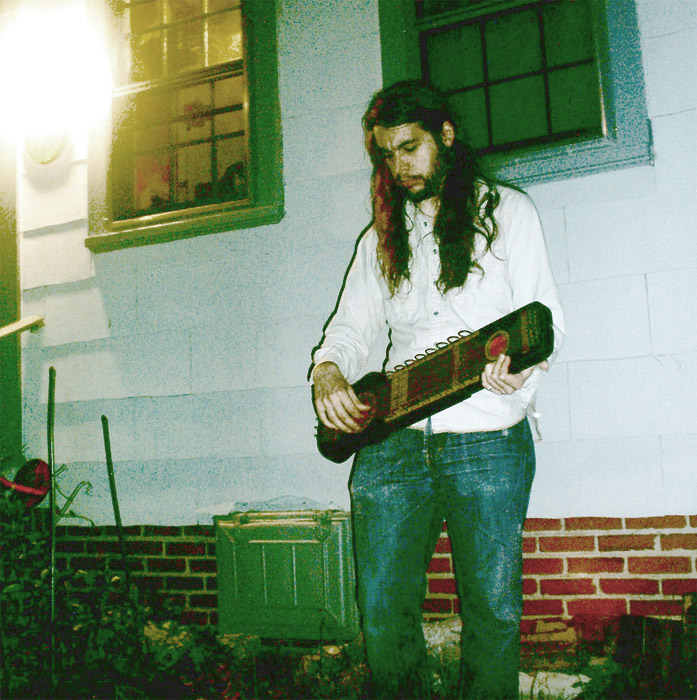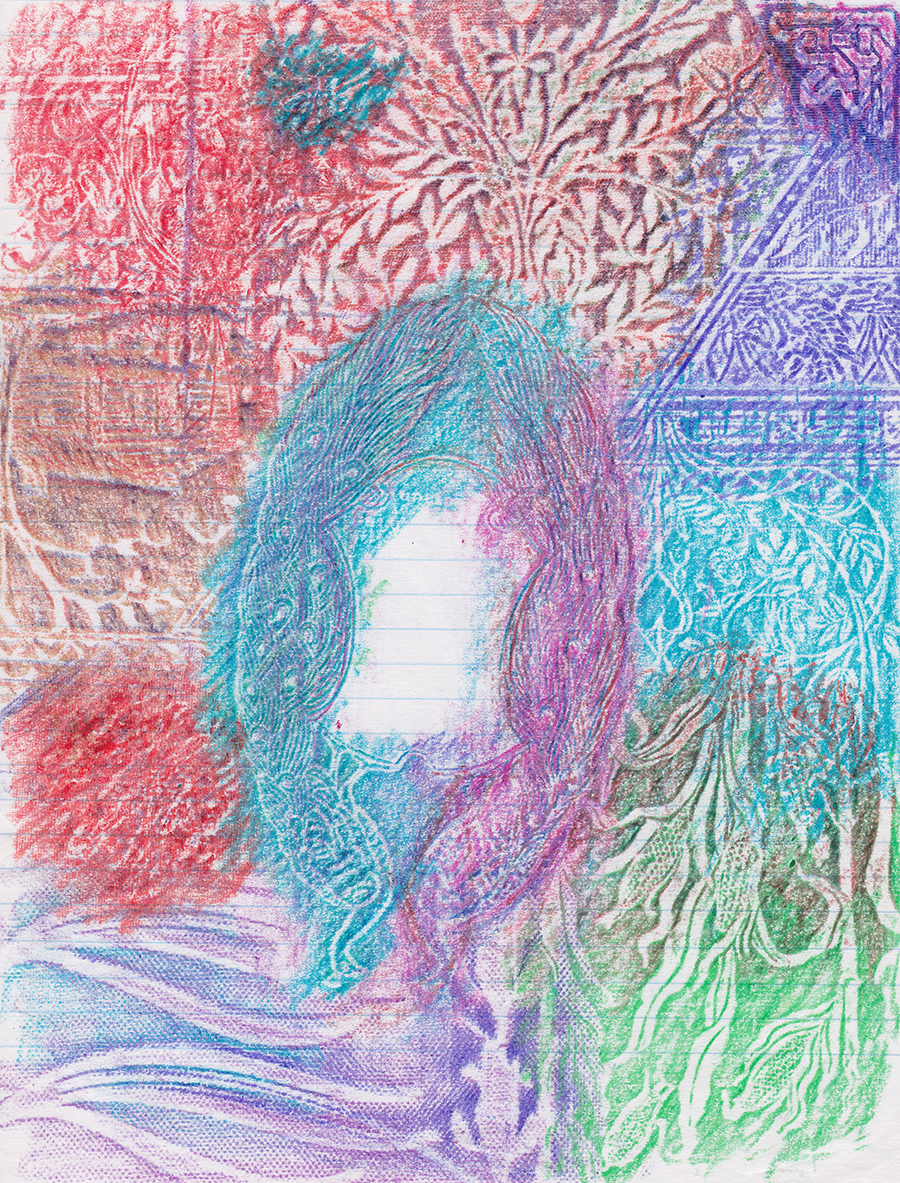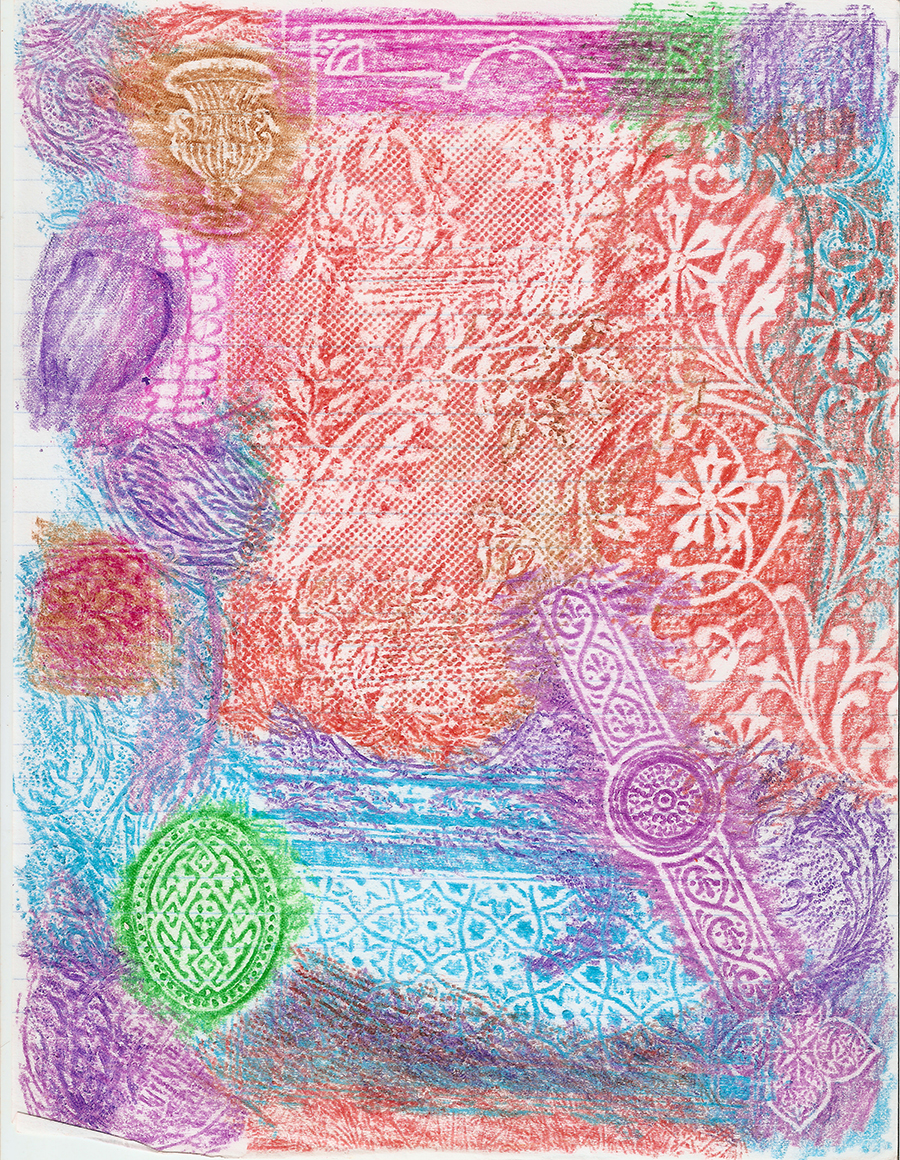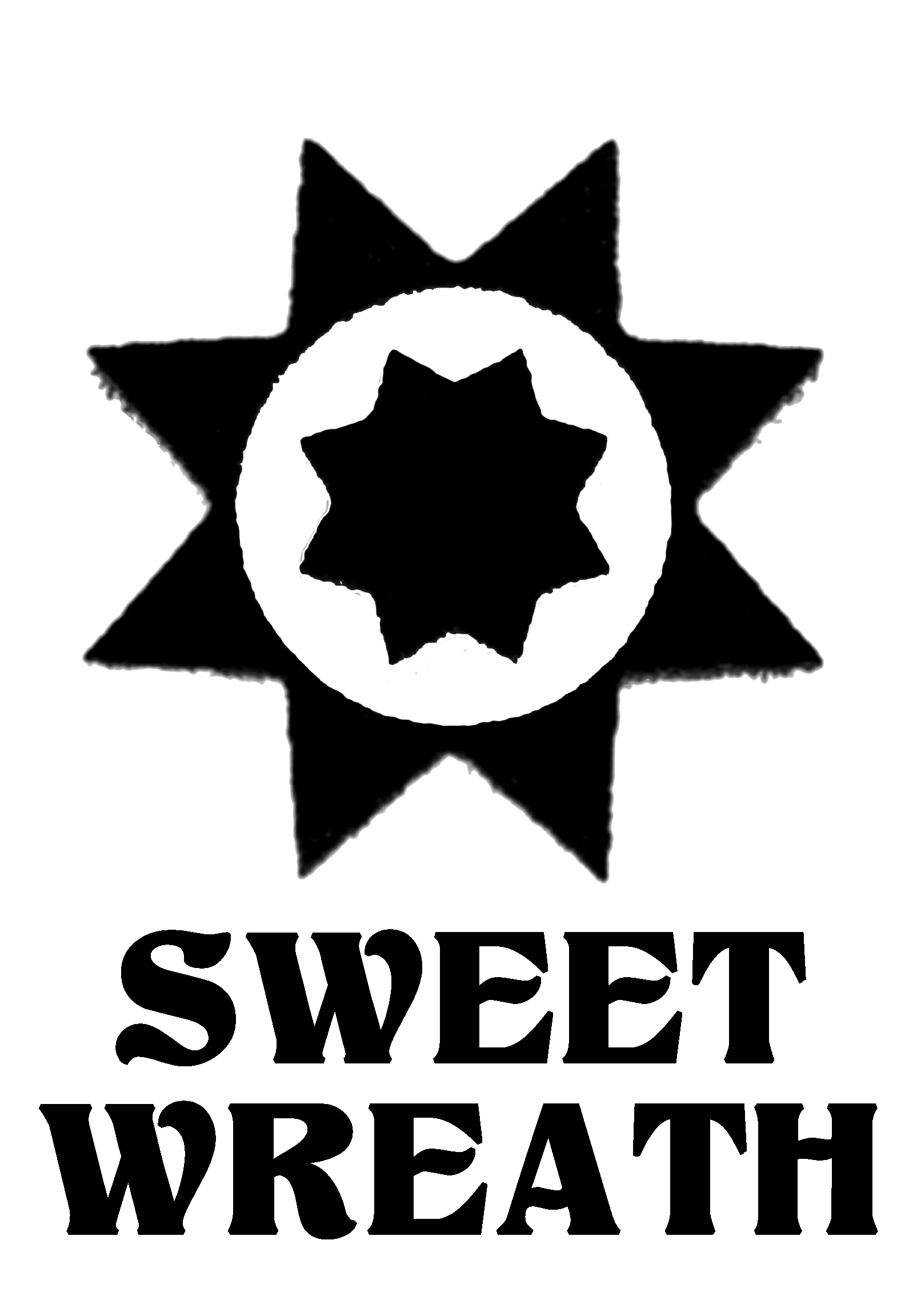


Double Vanities
How Come Your Sister Doesn’t Know My Name Anymore
Double Vanities is the project of Atlanta based poet and musician Matthew Goethe who sings and improvises on the ukelin, an early 20th century psaltery instrument. Using it as a sounding board for metaphysical free verse, Goethe's incantatory songs unfold in a rustic cascade of melody and dissonance, like a hand drawn map to a dilapidated barn you didn’t know you inherited. Featuring performances at several DIY venues that are either now gone or no longer hosting shows, this album serves as a poignant document of an evolving songwriting process within the ever shifting landscape of the Southern experimental underground.
As Goethe reflects, "I think the isolation of living in a small, strange town—Montevallo, Alabama—played a big role in how this music turned out. You’re imagination has a lot of space to wander in the slowness of a place like that and it can be easier to allow your mind to drift into that poetic state of unfocused focus where the best bits of imagery and language usually lie in wait for you."
"How Come…, is an album that rescues both the tradition of ancient folk music and an experimental heritage with which it manages to tie in this material. An album that seeks to be a transdimensional experience, beyond just a simple album....it creates spaces between pieces that are formed in complex memories of other times and other lives."
-Sebastián Franco, Review of the album in Densidad 20.25
Check out Matthew Goethe’s related writing in his new book of poems:
A Snowfire Not Born(e) Again
Sweet Wreath Speaks No. 7 Interview :
What in the hell is a ukelin? How did you happen to begin playing it?
The ukelin is pretty difficult to explain, but it's basically a type of zither that several companies began manufacturing in the '20's, which were sold door to door throughout the Depression as cheap and easy-to-play instruments for people who had no musical training. The reality though was that people who bought these often found them to be quite difficult to play as one had to be able to simultaneously bow strings with one hand and strum chords with the other. There are 16 bowable melody strings and 16 strummable strings separated into groups of four, each group tuned to a different chord. The name is a portmanteau of "ukulele" and "violin," though I don't know that anyone would say they necessarily sound like either. *(see Matthew playing it in the video below)
I guess I started playing it via a combination of curiosity, restlessness, and dumb luck. My first instrument was guitar and though I consider myself capable at it in my own extremely untrained manner, I began to grow tired of the habitual ways I played it, the way I suppose with any instrument one's habits eventually start to feel like, start to become ruts. I think this frustration with the guitar was what led me to begin to seek out other, less commonly used stringed instruments like autoharp, mandolin, etc. I first stumbled across the ukelin in an antique store in Red Hook, New York and was so enamored and confused by it that I bought it despite the fact that it looked (and was) beyond repair. A couple years passed before I came across the one I still use today in a thrift store in Alabaster, AL which thankfully was in good working order and which I bought without hesitation for $40. By this time, I had started performing solo using a violin in addition to guitar, so I was no longer as intimidated by the strangeness of the instrument and began trying to work out how I might be able to play it, to use it to write songs. Because there was so little information about them even on the internet at the time (I think there was maybe one Youtube video), I kind of had to just figure out my own way of playing it which was more droney and plucky then how they were intended to be played.
For these songs, how much of the material was worked out before performing it and how much was improvised live, as far as the ukelin parts and vocal lines?
It's hard to say, but probably close to 50-50. I would typically have three groups of lyrics that I would try to get to in the course of a set, which I guess one could call songs, though the music and even some of the lyrics could change from set to set. I love the freedom and challenge of improvisation and the creative tension one feels when doing this in front of an audience, so I like to leave blanks so to speak, usually between the sets of lyrics, where I have to conjure up something, be it good or bad. I also wanted the "songs" to feel organic, flowing into and out of each other, rather than being clearly demarcated--ambient noises and passages coalescing gradually or suddenly into melodies and words. Certain groups of lyrics and melodies solidified over time into more structurally stable songs. But even when performing those I would still allow myself the freedom to throw in new lyrics or bowing patterns or whatever I felt might discombobulate the song in a way that felt interesting to me. I guess this gets back to my restlessness and how I get easily bored with playing the same things and singing the same lyrics. It's like if you take that Four Tops lyric as a compositional mantra, "it's the same old song, but with a different meaning since you been gone." In other words, even if you are performing the same song, it will have a different meaning since the last time you played it (since you've be gone) because your feelings, your state of mind, won't be in the same place every time you perform it, and therefore, you"ll never truly play it the same way twice. So why not embrace that flux rather than trying to deaden yourself into playing it the same old way again and again.
What reference points in music or otherwise were you thinking about when writing this material?
Music-wise, Washington Phillips. The mental image of him plucking away furiously at his two giant, probably homemade zithers and singing beautifully over them was exciting and inspirational in terms of making me want to really explore the possibilities of the ukelin and autoharp. I was also drawn to the minimalism of musicians like Furry Lewis and Henry Flynt for their willingness to drive a riff or a drone so far into the ground that it somehow becomes transcendent and makes you want to ride it endlessly.
I think Scott Walker's work was maybe the biggest influence though, especially from Climate of the Hunter on, because he exploded the possibilities of what a song could be or do, of what you could ask it to do. I think he's one of the very few people who has been truly successful in marrying poetry to music, by which I mean the music and poetry were both exceptional as far as quality in their own right and could’ve stood on their own but were even greater together. His achievement is truly astounding, it’s like if Paul Celan or some other great post-modernist lyric poet suddenly decided they wanted to make music for their poetry and didn’t treat the music just as background but crafted something equally as beautiful as the poetry and also discovered they had an incredible singing voice to boot.
I also think the isolation of living in a small, strange town—Montevallo, AL—played a big role in how this music turned out. You’re imagination has a lot of space to wander in the slowness of a place like that and it can be easier to allow your mind to drift into that poetic state of unfocussed focus where the best bits of imagery and language usually lie in wait for you. You also have more time to just sit around a kitchen table and hash out ideas about life and art with your handful of good friends.
You write poems as well.....what relation do these songs have to your other writing? Are the songs adapted at all from longer text pieces?
A lot of the lyrics came from a group of poems I was writing at the time that eventually became a manuscript called A Snowfire Not Born(e) Again. By this, I don't mean I was able to simply transfer whole poems into songs. The process was much more piecemeal in that I would take certain lines, sometimes even from different poems, that seemed to fit with whatever sounds I had come up with and then slowly sculpt them until they felt right. Even the shows were part of this process of gradually sculpting songs as I would try out different lines, sometimes making them up on the spot. And I have a tendency to forget lyrics or botch them somehow anyway, so being able to improvise is kind of imperative for me.
You've self-released some material under the name Double Vanities in the past couple years, but the material on this album pre-dates that. How do you see the musical trajectory from these live performances to what you're doing now?
I’ve been performing solo for roughly 12 years now and up until 2016, I did so under the name Cedro Danado. I changed the name partially to signal a shift from the noise folk aesthetic to one that incorporated more electronic elements, synths and the like. But it’s really just an extension of that project which has gone through several incarnations, the first being more of a noise project using instruments like amplified violin and hammered dulcimer, guitar, box fan, and other household objects; the second (the one these recordings were from) was when I got hyper focused on ukelin and trying to write these structurally open-ended poem-songs that still incorporated some of the noise elements from the first period, and then that slowly transitioned into the Double Vanities phase of the project.
The performances on the album occurred on tour in three different states. Any impressions or memories from these shows and the places where they happened?
Honestly, tours are always kind of a blur. They're sort of like existing in a days long dream, especially in retrospect. I definitely have very fond memories of playing in the back of Golden Bough Bookstore. There's a perfect little dream right there, getting to play a show and then look through shelves upon shelves of books. I felt like I usually played really good sets there and the audiences were always super responsive and willing to go along for the weird ride. I genuinely love a lot of the people I met playing in Macon, both at Golden Bough and Fresh Produce Records, many of whom now live and do music in Atlanta and Athens. I remember playing on the street in front of Stranded Art Collective in Montevallo, AL, having to really belt those songs out so I wasn't drowned out by the passing cars, especially since I had no amplification whatsoever. I also remember playing at the Imaginarium in Columbia, SC, feeling very frazzled and worn out as I was nearing the end of the dream of that tour only to enter someone else's dream in the form of this show house which felt more like a lived-in art installation, art covering literally every surface of the place, ceilings and all.
How Come Your Sister Doesn’t Know My Name Anymore
Double Vanities is the project of Atlanta based poet and musician Matthew Goethe who sings and improvises on the ukelin, an early 20th century psaltery instrument. Using it as a sounding board for metaphysical free verse, Goethe's incantatory songs unfold in a rustic cascade of melody and dissonance, like a hand drawn map to a dilapidated barn you didn’t know you inherited. Featuring performances at several DIY venues that are either now gone or no longer hosting shows, this album serves as a poignant document of an evolving songwriting process within the ever shifting landscape of the Southern experimental underground.
As Goethe reflects, "I think the isolation of living in a small, strange town—Montevallo, Alabama—played a big role in how this music turned out. You’re imagination has a lot of space to wander in the slowness of a place like that and it can be easier to allow your mind to drift into that poetic state of unfocused focus where the best bits of imagery and language usually lie in wait for you."
"How Come…, is an album that rescues both the tradition of ancient folk music and an experimental heritage with which it manages to tie in this material. An album that seeks to be a transdimensional experience, beyond just a simple album....it creates spaces between pieces that are formed in complex memories of other times and other lives."
-Sebastián Franco, Review of the album in Densidad 20.25
Check out Matthew Goethe’s related writing in his new book of poems:
A Snowfire Not Born(e) Again
Sweet Wreath Speaks No. 7 Interview :
What in the hell is a ukelin? How did you happen to begin playing it?
The ukelin is pretty difficult to explain, but it's basically a type of zither that several companies began manufacturing in the '20's, which were sold door to door throughout the Depression as cheap and easy-to-play instruments for people who had no musical training. The reality though was that people who bought these often found them to be quite difficult to play as one had to be able to simultaneously bow strings with one hand and strum chords with the other. There are 16 bowable melody strings and 16 strummable strings separated into groups of four, each group tuned to a different chord. The name is a portmanteau of "ukulele" and "violin," though I don't know that anyone would say they necessarily sound like either. *(see Matthew playing it in the video below)
I guess I started playing it via a combination of curiosity, restlessness, and dumb luck. My first instrument was guitar and though I consider myself capable at it in my own extremely untrained manner, I began to grow tired of the habitual ways I played it, the way I suppose with any instrument one's habits eventually start to feel like, start to become ruts. I think this frustration with the guitar was what led me to begin to seek out other, less commonly used stringed instruments like autoharp, mandolin, etc. I first stumbled across the ukelin in an antique store in Red Hook, New York and was so enamored and confused by it that I bought it despite the fact that it looked (and was) beyond repair. A couple years passed before I came across the one I still use today in a thrift store in Alabaster, AL which thankfully was in good working order and which I bought without hesitation for $40. By this time, I had started performing solo using a violin in addition to guitar, so I was no longer as intimidated by the strangeness of the instrument and began trying to work out how I might be able to play it, to use it to write songs. Because there was so little information about them even on the internet at the time (I think there was maybe one Youtube video), I kind of had to just figure out my own way of playing it which was more droney and plucky then how they were intended to be played.
For these songs, how much of the material was worked out before performing it and how much was improvised live, as far as the ukelin parts and vocal lines?
It's hard to say, but probably close to 50-50. I would typically have three groups of lyrics that I would try to get to in the course of a set, which I guess one could call songs, though the music and even some of the lyrics could change from set to set. I love the freedom and challenge of improvisation and the creative tension one feels when doing this in front of an audience, so I like to leave blanks so to speak, usually between the sets of lyrics, where I have to conjure up something, be it good or bad. I also wanted the "songs" to feel organic, flowing into and out of each other, rather than being clearly demarcated--ambient noises and passages coalescing gradually or suddenly into melodies and words. Certain groups of lyrics and melodies solidified over time into more structurally stable songs. But even when performing those I would still allow myself the freedom to throw in new lyrics or bowing patterns or whatever I felt might discombobulate the song in a way that felt interesting to me. I guess this gets back to my restlessness and how I get easily bored with playing the same things and singing the same lyrics. It's like if you take that Four Tops lyric as a compositional mantra, "it's the same old song, but with a different meaning since you been gone." In other words, even if you are performing the same song, it will have a different meaning since the last time you played it (since you've be gone) because your feelings, your state of mind, won't be in the same place every time you perform it, and therefore, you"ll never truly play it the same way twice. So why not embrace that flux rather than trying to deaden yourself into playing it the same old way again and again.
What reference points in music or otherwise were you thinking about when writing this material?
Music-wise, Washington Phillips. The mental image of him plucking away furiously at his two giant, probably homemade zithers and singing beautifully over them was exciting and inspirational in terms of making me want to really explore the possibilities of the ukelin and autoharp. I was also drawn to the minimalism of musicians like Furry Lewis and Henry Flynt for their willingness to drive a riff or a drone so far into the ground that it somehow becomes transcendent and makes you want to ride it endlessly.
I think Scott Walker's work was maybe the biggest influence though, especially from Climate of the Hunter on, because he exploded the possibilities of what a song could be or do, of what you could ask it to do. I think he's one of the very few people who has been truly successful in marrying poetry to music, by which I mean the music and poetry were both exceptional as far as quality in their own right and could’ve stood on their own but were even greater together. His achievement is truly astounding, it’s like if Paul Celan or some other great post-modernist lyric poet suddenly decided they wanted to make music for their poetry and didn’t treat the music just as background but crafted something equally as beautiful as the poetry and also discovered they had an incredible singing voice to boot.
I also think the isolation of living in a small, strange town—Montevallo, AL—played a big role in how this music turned out. You’re imagination has a lot of space to wander in the slowness of a place like that and it can be easier to allow your mind to drift into that poetic state of unfocussed focus where the best bits of imagery and language usually lie in wait for you. You also have more time to just sit around a kitchen table and hash out ideas about life and art with your handful of good friends.
You write poems as well.....what relation do these songs have to your other writing? Are the songs adapted at all from longer text pieces?
A lot of the lyrics came from a group of poems I was writing at the time that eventually became a manuscript called A Snowfire Not Born(e) Again. By this, I don't mean I was able to simply transfer whole poems into songs. The process was much more piecemeal in that I would take certain lines, sometimes even from different poems, that seemed to fit with whatever sounds I had come up with and then slowly sculpt them until they felt right. Even the shows were part of this process of gradually sculpting songs as I would try out different lines, sometimes making them up on the spot. And I have a tendency to forget lyrics or botch them somehow anyway, so being able to improvise is kind of imperative for me.
You've self-released some material under the name Double Vanities in the past couple years, but the material on this album pre-dates that. How do you see the musical trajectory from these live performances to what you're doing now?
I’ve been performing solo for roughly 12 years now and up until 2016, I did so under the name Cedro Danado. I changed the name partially to signal a shift from the noise folk aesthetic to one that incorporated more electronic elements, synths and the like. But it’s really just an extension of that project which has gone through several incarnations, the first being more of a noise project using instruments like amplified violin and hammered dulcimer, guitar, box fan, and other household objects; the second (the one these recordings were from) was when I got hyper focused on ukelin and trying to write these structurally open-ended poem-songs that still incorporated some of the noise elements from the first period, and then that slowly transitioned into the Double Vanities phase of the project.
The performances on the album occurred on tour in three different states. Any impressions or memories from these shows and the places where they happened?
Honestly, tours are always kind of a blur. They're sort of like existing in a days long dream, especially in retrospect. I definitely have very fond memories of playing in the back of Golden Bough Bookstore. There's a perfect little dream right there, getting to play a show and then look through shelves upon shelves of books. I felt like I usually played really good sets there and the audiences were always super responsive and willing to go along for the weird ride. I genuinely love a lot of the people I met playing in Macon, both at Golden Bough and Fresh Produce Records, many of whom now live and do music in Atlanta and Athens. I remember playing on the street in front of Stranded Art Collective in Montevallo, AL, having to really belt those songs out so I wasn't drowned out by the passing cars, especially since I had no amplification whatsoever. I also remember playing at the Imaginarium in Columbia, SC, feeling very frazzled and worn out as I was nearing the end of the dream of that tour only to enter someone else's dream in the form of this show house which felt more like a lived-in art installation, art covering literally every surface of the place, ceilings and all.
